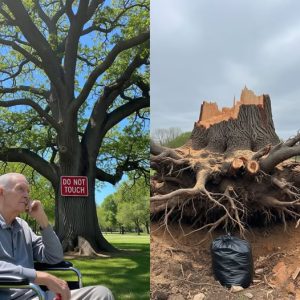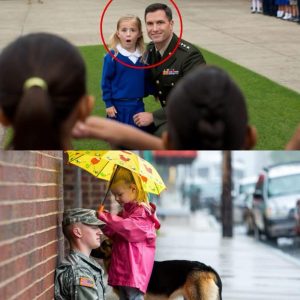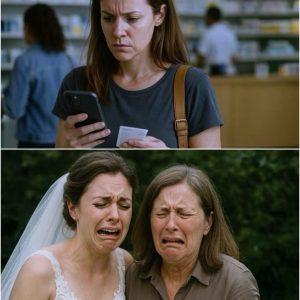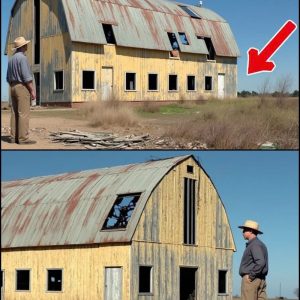The nurse smiled as she handed me the papers, her voice soft as she said, “You’re cleared to go, Mr. Hayes. The doctor signed off—said you’re recovering faster than most.” I forced a weak smile, my chest still sore from the procedure. Three nights of beeping monitors, harsh fluorescent lights, and a silence where my wife’s voice should have been. Not once did Claire come. She had said hospitals gave her anxiety, that she couldn’t stand the smell. At the time, I believed her. Or at least, I told myself I did.
The taxi ride home felt endless. The driver hummed along to the radio while I watched the streetlights pass, my mind floating toward home. I thought of the comfort of my own bed, the taste of Claire’s cooking, the simple, quiet act of being back with her. But when the cab pulled into the driveway, that peaceful thought shattered. Her car was already there—but not parked as she usually did. It was crooked, quickly pulled in, as if she hadn’t cared to straighten it. That small detail stuck with me, gnawing at me.
I paid the fare, grabbed my carry-on bag, and walked to the door. There were no lights on downstairs, only a faint glow filtering from the second floor. The house was too quiet, that kind of silence that makes your skin tense up. I didn’t call out for Claire. I don’t even know why. Instinct told me not to. Each creak of the stairs sounded louder than the last, my heart beating harder with every step.
The bedroom door was slightly ajar. Just enough to see the shadows shifting inside. I pushed it open slowly. And then, there they were. My wife, tangled in sheets with a man I had never seen before. My bed. Our bed. The one I thought I was coming back to.
On the nightstand, our wedding photo leaned slightly sideways, as if it had witnessed every second of the betrayal. I stood frozen in the doorway, watching in silence for what felt like an eternity—ten seconds, maybe longer. They didn’t even notice me.
I didn’t scream. I didn’t throw anything. I didn’t give them the satisfaction of watching me break. I turned around, walked out as silently as I had entered, and left without saying a single word. By the time I reached the bottom step, I had already made a decision. I blocked all the cards. I changed all the locks. And I made sure she couldn’t reach me.
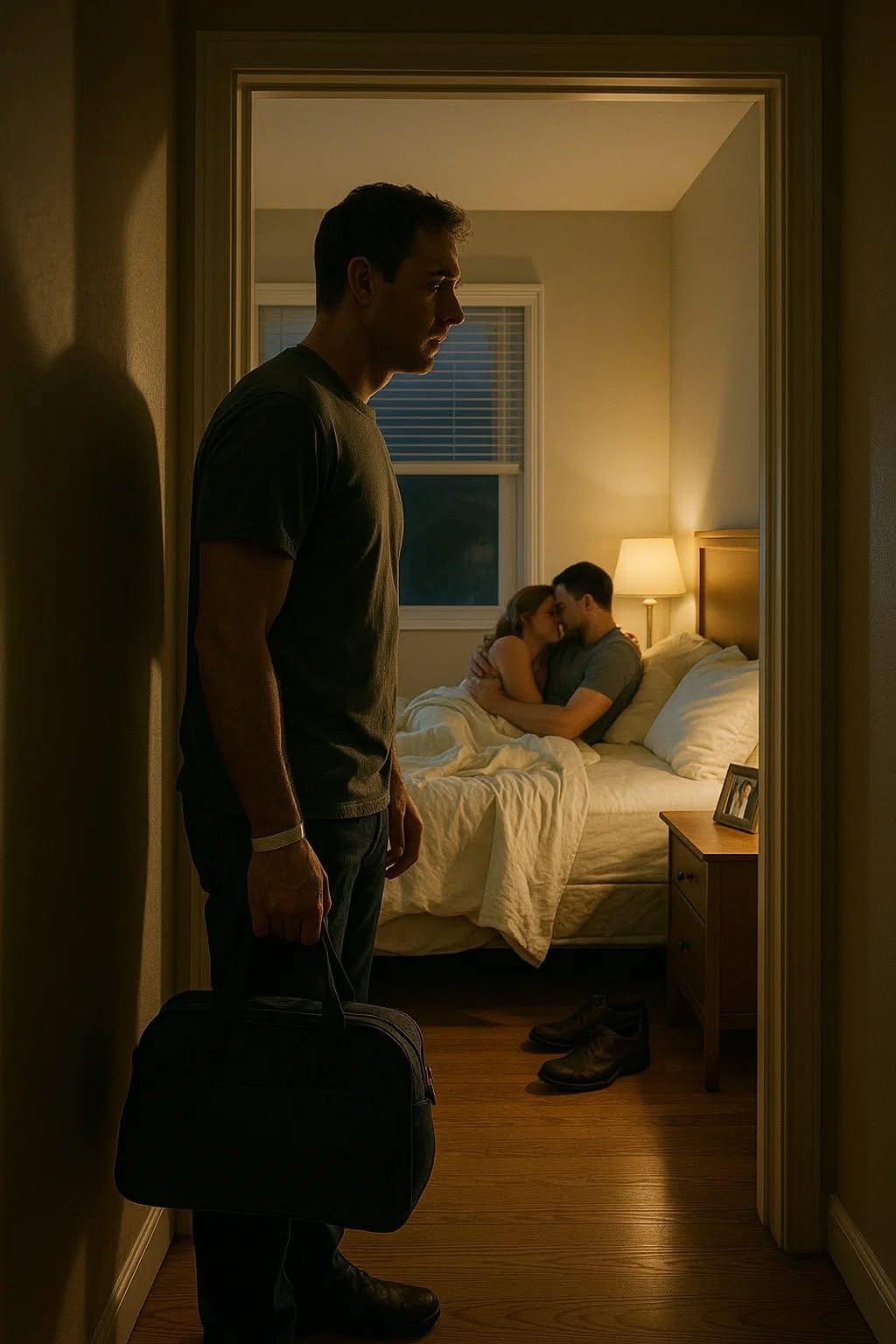
I stood on the front steps until the taxi’s taillights vanished, feeling the house’s breath on my back. It was a strange kind of calm—cold, clear, procedural. Whatever came next would require things I hadn’t used in a long time: planning, patience, and the kind of detachment that keeps you from doing something you’ll regret.
First order: make it impossible for her to bleed me dry while she practiced grief in our sheets. I changed the passwords on every account, transferred anything joint into my name, and called the bank. No questions asked; I explained the situation succinctly and asked them to flag any suspicious activity. Second order: safety. I exchanged the locks, put a simple alarm on the doors, and left a forwarding address that wasn’t the house.
Then I did something I never thought I would—something small that felt enormous: I called my sister. She arrived with a duffel and an armful of sandwiches like it was still fourteen and we were running away from a party we’d both outgrown. She asked none of the questions I didn’t want to answer and folded my anger into a plan.
Over the next forty-eight hours I moved with the efficiency of someone who has been practicing survival without wanting to know it. I took only what I would need for a start: the photos I couldn’t bear to lose, the jacket my father had given me, the little blue mug Claire always left in the dishwasher. I packed the rest into labeled boxes and left them with a friend until the lawyers told me otherwise.
I hired a lawyer that afternoon—not the theatrically vindictive kind but the competent, buttoned-up sort who smelled of coffee and deadlines. We met in a narrow office that smelled faintly of paper and resolve. I handed over the photos, the name the other man had given, the dates and times I’d been in and out of the hospital, Claire’s lies about why she hadn’t visited, the crooked parking job that had felt like a clue. My lawyer listened. She typed. She said things like “equitable distribution” and “temporary restraining order” in a way that made the world feel less personal and more like a ledger that at least would balance.
I didn’t want a scene. I didn’t want to be the man on the lawn yelling while neighbors peered from hedges. I wanted something quieter, the kind of defeat that can be cataloged and remedied: money divided, keys collected, names changed.
We filed for divorce. We asked for temporary custody of the dog (the only creature in our house that had shown up the night I was in the hospital). We asked for a hearing to restrict Claire from transferring or liquidating assets. The judge signed the temporary orders with a neutral hand, as if divorces are just paperwork that needs initials.
When Claire called that night—when she finally woke up from the bedlam of her new arrangement and realized I wasn’t there—she started with panic and spiraled into accusation. I let the call go to voicemail. I didn’t reply to the texts. Silence had become a tool and I used it. For the first time, refusing to engage felt like a defense, not a punishment.
The hearing was clinical. We sat in opposite corners of a courtroom that smelled like old wood and late-afternoon sunlight. Claire’s lover wore a suit he’d clearly never had to fight in; he was shaky, as if he hadn’t anticipated the paperwork or the quietness of truth. When my lawyer presented the bank flags, the night I’d been discharged early, the photos of an empty house with a crooked parked car—simple things assembled into a narrative—they couldn’t weasel the story away. The judge granted the temporary orders. The sheriff served them a notice to vacate a portion of the house so the property could be assessed.
What I hadn’t expected was how unimportant the house would soon feel. The first night in my sister’s spare room I slept like a man defused; sleep came steady and belonged to me. The mattress was thin. The mug was chipped. The sky outside was a little too bright at five in the morning. But I woke without the muscle of dread that had lived under my ribs for months.
People did surprising things. Friends I had thought distant showed up with casseroles. The nurse who’d discharged me sent a text—“Hope you’re okay. Call if you need anything.” My father, who had always been awkward with emotion, called twice and then sat on my stoop one evening and smoked while we talked about nothing in particular. The dog learned quickly to love my sister’s couch.
Claire tried to turn the story into a performance—posts that hinted at betrayal without naming me, calls to friends that painted me as cold and uncaring. For a few hours the small world we lived in tilted toward her version. Then life, stubborn and slow, corrected itself. People prefer stability over spectacle; in the end, your neighbors want the high school choir fundraiser to go on, not to be entertained by someone’s personal ruin.
Months later, when the divorce was final and my name quietly removed from a mailbox and a mortgage ledger, I signed the last form without rancor. The house remained hers—walls rearranged, nursery painted, the bed I had once shared now hosting someone else’s whispers. I closed that door without slamming it.
What I kept was simpler: my dignity, my freedom, and the knowledge that I had not become the version of myself that would break on the spot for the sake of a marriage that had already collapsed. I kept the little blue mug and a photo of a summer when Claire and I were happy, the edges softened like a memory you don’t need to fix.
On a quiet Sunday, months after the hospital beeps and the crooked parking job, I bought a mattress with my own hands and set it in an apartment that smelled like fresh paint and possibility. I stood over it for a long time, thinking of the bed I had left behind—the sheets that had once housed promise and then betrayal. I made the bed slowly, folding the corners like a neat goodbye.
When Leo—my neighbor’s dog, now my steady companion—sauntered into the room and circled twice before plopping down at my feet, I laughed. It was the first clean laugh in a long time.
I had not screamed in the doorway. I had not thrown things. Instead I had built a new life out of the paperwork and precaution. And when, on a Tuesday afternoon, I opened my laptop to the first email from the company offering me a modest consulting position—simple, honorable work—I felt, for the first time in months, a hunger that was not for revenge but for what comes next.
The rest of it—Claire’s apologies that never came, the way the house looked on moving day from across the street—were small scenes that belonged to a chapter I closed. I was not ruined. I was remaking.
I went to bed that night—the new mattress warm and mine—rolled onto my side, and slept. No illusions, no theatrics. Just sleep, honest and complete, and a morning that would belong only to me.


